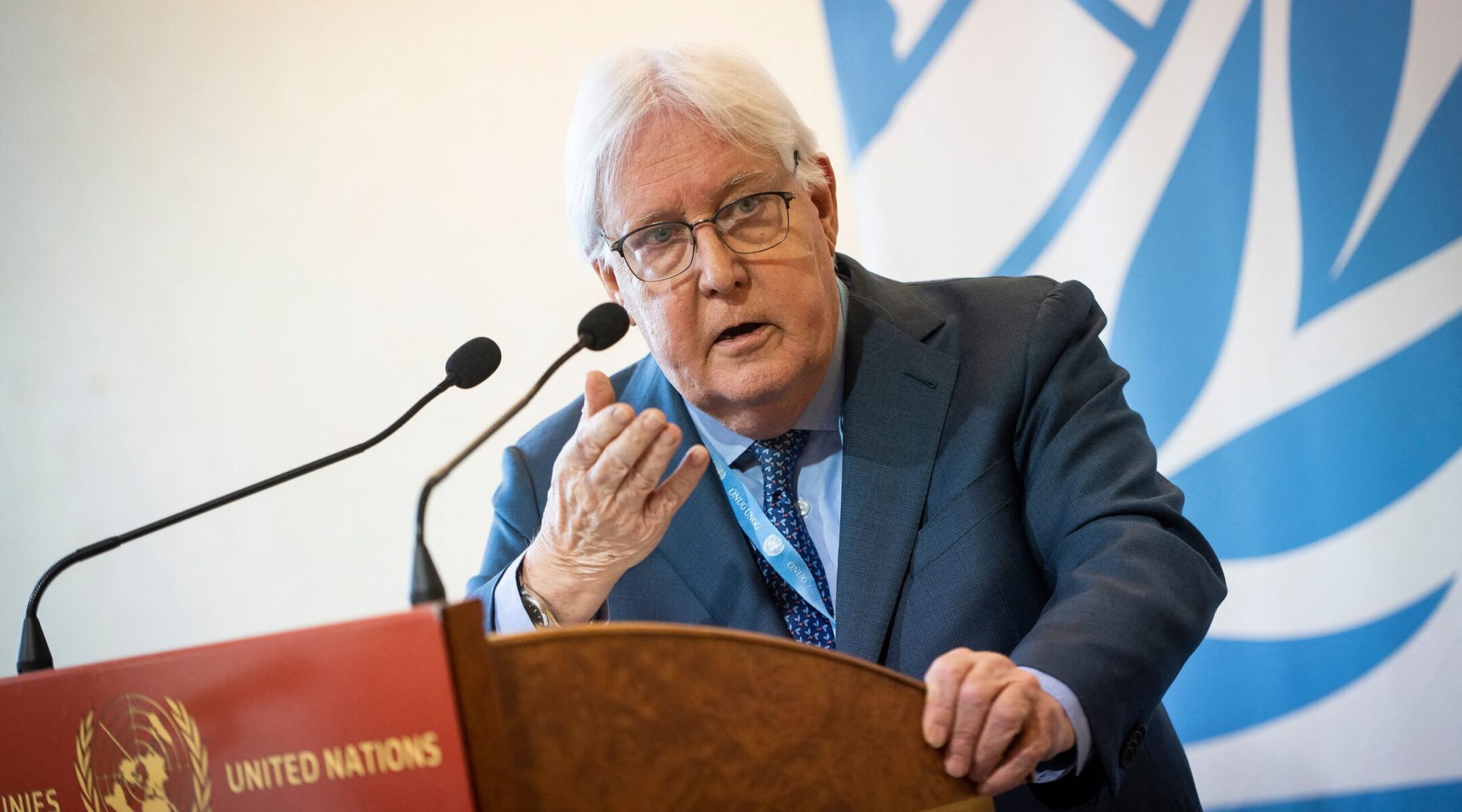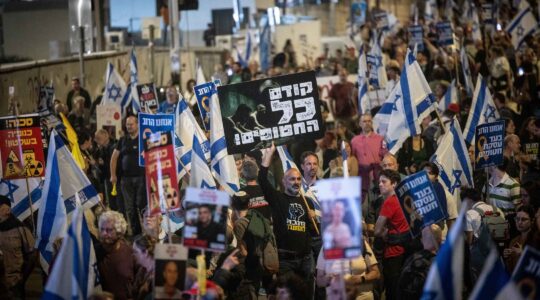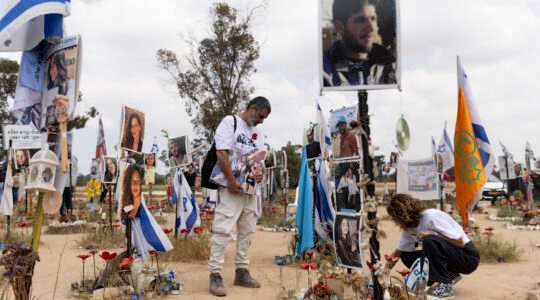(JTA) — A top United Nations official said Hamas was “not a terrorist organization” on Wednesday, sparking outrage from Israel as the U.N. grapples with allegations of anti-Israel bias and antisemitism.
Asked in a TV interview on Wednesday about Israel’s plan to eliminate Hamas, Martin Griffiths, the head of the U.N. Office for the Coordination of Humanitarian Affairs, said, “I’ve worked with many, many different terrorist and insurgent groups.”
“Hamas is not a terrorist group for us, of course, as you know. It’s a political movement,” Griffiths added in the exchange on the U.K.’s Sky News.
Following criticism, Griffiths aimed to clarify his statement on Thursday afternoon, but ended up drawing more backlash.
“Just to clarify: Hamas is not on the list of groups designated as terrorist organizations by the United Nations Security Council,” he wrote on X, formerly Twitter. Referring to the group’s invasion of Israel, in which it killed approximately 1,200 people and took some 250 hostages, he added, “This doesn’t make their acts of terror on 7 October any less horrific and reprehensible, as I’ve been saying all along.”
The post drew rebukes from Israel and Germany’s foreign ministry. Israel, the United States, the European Union, the United Kingdom and other countries have designated Hamas a terror group.
“Just to clarify,” Israel’s official account on X responded, tagging Griffiths, “you’re a Hamas apologist and your statements are an insult to every single victim of October 7th. Pathetic.”
Griffiths’ agency, known as OCHA, coordinates international responses to humanitarian crises. A British national, he was appointed to his position by U.N. Secretary-General Antonio Guterres in 2021 after working in the field of humanitarian aid for 50 years.
In the interview, Griffiths acknowledged the trauma of Oct. 7 in Israel, but averred that Israel likely could not win a military victory. He instead urged “dialogue” to end the conflict.
“If you want to have safety and security with people who are inevitably going to continue to be your neighbor in some form or another you’re going to have to create a relationship based on some shared values,” Griffiths said.
Israeli officials, who have long derided the U.N. as deeply biased against Israel, castigated Griffiths and the U.N. for the remarks.
“Shame on him,” Israeli Foreign Minister Israel Katz said in a post on X. “We’ll eliminate Hamas with them or without them.”
Griffiths’ comments stood out because he is a high-level official appointed by Guterres, and because the office he leads is part of the U.N. Secretariat, the U.N.’s six principal agencies.
His comments come days after the U.N. special rapporteur for the Palestinians, Francesca Albanese, incensed Israel and its supporters by saying victims of the Oct. 7 attack “were not killed because of their Judaism, but in response to Israel’s oppression.” In response, Israel said she was formally banned from entering the country, although she had already been refused entry.
Unlike Griffiths, Albanese is an independent investigator appointed by the U.N. Human Rights Council, a separate body from the General Assembly. Guterres’ office has repeatedly said he has no control over the hiring or firing of special rapporteurs, nor does he have any sway over their activities.
Asked about Griffiths’ statement, a spokesperson for Guterres said at a Thursday press briefing that “the designation for the U.N. of an entity as a terror organization can only be made by the Security Council.”
Albanese’s comments were condemned by Israeli officials, the French and German foreign ministries, the U.S. mission to the U.N., and the State Department’s envoy for antisemitism, Deborah Lipstadt. In the past, Albanese has said the United States is “subjugated by the Jewish lobby.” Members of Congress from both parties have pushed for her removal.
Guterres has sought to strike a balance between condemning both Hamas terrorism and Israeli military action in Gaza. On Oct. 25, he angered Israelis by saying that the Hamas attack “did not happen in a vacuum,” linking the terrorist atrocities to occupation, settlements and economic woes. The statement strained an already fraught relationship between the U.N. leadership and Israel.
Guterres has also met with the families of Israeli hostages and formed an unlikely relationship with a group of Israeli protesters that gathers outside his Midtown home every Friday morning to advocate for the hostages. He met with members of Munich’s Jewish community during a visit to Germany on Thursday and advocated for the release of the hostages. Guterres has repeatedly called Oct. 7 an act of terror.
Both the General Assembly and the Human Rights Council annually condemn Israel more than all other countries combined.
Israel also accuses the United Nations Relief and Works Agency, known as UNRWA, the aid agency for Palestinians, of abetting Hamas and perpetuating the conflict.
Israel has said a portion of UNRWA staffers participated in the Oct. 7 attack and are affiliated with Hamas. The Israeli military found a Hamas data center beneath, and connected to, UNRWA’s Gaza headquarters last week, and has repeatedly found tunnels and weapons in and around UNRWA facilities.
UNRWA’s critics argue that it perpetuates the conflict by automatically granting refugee status to all Palestinians descended from those displaced by the 1948 war, unlike all other refugee groups worldwide. Critics also say UNRWA uses anti-Israel and antisemitic educational materials in schools. Albanese is a former UNRWA staffer.
U.N. officials and others in the humanitarian aid world argue UNRWA is essential for providing aid to the Palestinians, especially during the war, which has caused widespread suffering and deprivation in Gaza.
More than 28,000 Palestinians have been killed in the war, according to the Hamas-run Gaza health ministry. Israel says roughly a third of those killed are combatants. More than 200 Israeli soldiers have been killed in the invasion of Gaza.
JTA has documented Jewish history in real-time for over a century. Keep our journalism strong by joining us in supporting independent, award-winning reporting.






